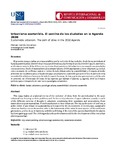Mostrar o rexistro simple do ítem
Urbanismo sostenible. El camino de las ciudades en la Agenda 2030
| dc.contributor.author | García Docampo, Manuel | |
| dc.date.accessioned | 2022-05-09T08:01:16Z | |
| dc.date.available | 2022-05-09T08:01:16Z | |
| dc.date.issued | 2021 | |
| dc.identifier.citation | Docampo García, M. (2022). Urbanismo sostenible. El camino de las ciudades en la Agenda 2030. Revista Internacional de Comunicación y Desarrollo (RICD), 4(15), 105-119. https://doi.org/10.15304/ricd.4.15.8061 | es_ES |
| dc.identifier.issn | 2386-3730 | |
| dc.identifier.uri | http://hdl.handle.net/2183/30621 | |
| dc.description.abstract | [Resumen] El presente ensayo realiza un repaso analítico por la evolución de las ciudades, desde la era preindustrial hasta la postindustrial, deteniéndose en sus problemáticas y las formas de producción del espacio. Asimismo, se efectúa un estudio de las diferentes corrientes de pensamiento del urbanismo, escrutando sus postulados y proposiciones. Desde el materialismo al postmaterialismo. Del Posturbanism al New Urbanism. La ciudad, como escenario de conflictos, está en el centro de todo debate sobre la sostenibilidad y el respeto al medio ambiente. En los últimos años se ha abierto paso un urbanismo sostenible que pone el foco de atención en la necesidad de referirse a la mejora de toda la especie humana, de ésta y próximas generaciones y de hacerlo en armonía con el bienestar del resto de las especies que habitan el planeta. La Agenda 2030 es el marco perfecto para el desarrollo de este nuevo paradigma urbanístico. | es_ES |
| dc.description.abstract | [Abstract] This essay makes an analytical review of the evolution of cities, from the pre-industrial to the post-industrial era, focusing on their problems and the forms of production of space. Likewise, a study is made of the different currents of thought in urbanism, scrutinizing their postulates and propositions. From materialism to post-materialism. From Posturbanism to New Urbanism. The city, as the scene of conflicts, is at the center of any debate on sustainability and respect for the environment. In recent years, sustainable urbanism that focuses on the need to refer to the betterment of the entire human species, of this and future generations, and to do so in harmony with the well-being of the rest of the species that inhabit the planet, has been gaining ground. The 2030 Agenda is the perfect framework for the development of this new urban planning paradigm. | es_ES |
| dc.language.iso | spa | es_ES |
| dc.publisher | Universidade de Santiago de Compostela | es_ES |
| dc.relation.uri | https://doi.org/10.15304/ricd.4.15.8061 | es_ES |
| dc.rights | Atribución-NoComercial-SinDerivadas 4.0 Internacional | es_ES |
| dc.rights.uri | http://creativecommons.org/licenses/by-nc-nd/4.0/ | * |
| dc.subject | Ciudad | es_ES |
| dc.subject | Urbanismo | es_ES |
| dc.subject | Sociología urbana | es_ES |
| dc.subject | Sostenibilidad | es_ES |
| dc.subject | Urbanismo sostenible | es_ES |
| dc.subject | City | es_ES |
| dc.subject | Urban planning | es_ES |
| dc.subject | Urban sociology | es_ES |
| dc.subject | Sustainability | es_ES |
| dc.subject | Sustainable urbanism | es_ES |
| dc.title | Urbanismo sostenible. El camino de las ciudades en la Agenda 2030 | es_ES |
| dc.title.alternative | Sustainable Urbanism. The Path of Cities in the 2030 Agenda | es_ES |
| dc.type | info:eu-repo/semantics/article | es_ES |
| dc.rights.access | info:eu-repo/semantics/openAccess | es_ES |
| UDC.journalTitle | Revista Internacional de Comunicación y Desarrollo | es_ES |
| UDC.volume | 4 | es_ES |
| UDC.issue | 15 | es_ES |
| UDC.startPage | 105 | es_ES |
| UDC.endPage | 119 | es_ES |
Ficheiros no ítem
Este ítem aparece na(s) seguinte(s) colección(s)
-
GI-GET - Artigos [58]






